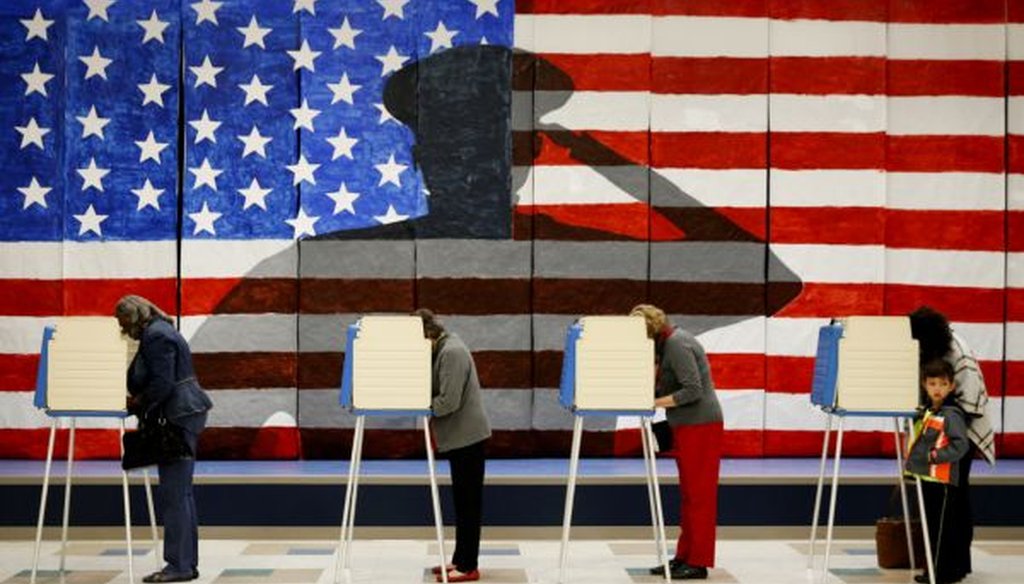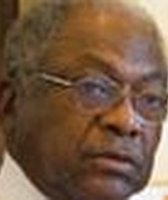Get PolitiFact in your inbox.

Voters line up in booths to cast their ballots at Robious Elementary School in Chesterfield, Va. on Nov. 8, 2016. (AP)
If Your Time is short
-
Virginia and Alabama officials said in August they had flagged thousands of noncitizens or potential noncitizens on voter rolls, putting them at risk of removal from the rolls.
-
The Justice Department filed lawsuits against both states in the fall, accusing them of violating the “quiet period” provision of a federal law that bans systematic removal of voters within 90 days of a federal election.
-
The provision aims to avoid having people who were removed in error from voter rolls running out of time to rectify it before Election Day.
The Justice Department sued Virginia and Alabama, accusing the states of violating federal law by recently flagging thousands of voters as noncitizens or potential noncitizens, putting them at risk of removal from voter rolls.
Former President Donald Trump pointed to the Virginia lawsuit filed weeks before Election Day as proof the federal agency is being weaponized so Democrats can allow noncitizens to cast ballots in the federal election.
"One of the Greatest Examples of DOJ Weaponization is the fact that they are suing Virginia to put ALL of the Illegal Voters, which were fully exposed and removed by the important work of Governor Glenn Youngkin, back on the Voter Rolls," Trump wrote Oct. 14 on Truth Social. "Obviously, this was done so that they can CHEAT on the Election. So sad! What has happened to our once Great Country?"
Trump repeated the claim Oct. 15 in an interview with the Economic Club of Chicago.
"Virginia cleaned up its voter rolls and got rid of thousands and thousands of bad votes and the Justice Department sued them, that they should be allowed to put those bad votes and illegal votes back in and let the people vote."
Social media posts by Trump supporters also have echoed the claim.
But that’s not what the lawsuits show. PolitiFact set out to answer voters’ questions about the purpose of the Justice Department’s lawsuits.
The Justice Department’s lawsuit filings say the states violated long-standing federal law that prevents eligible voters from being removed from the voting rolls within 90 days of a federal election.
We asked Trump’s campaign for evidence that the Justice Department’s Virginia lawsuit is an effort to allow cheating. Campaign spokesperson Karoline Leavitt said Democrats have allowed noncitizen voting in some places such as the District of Columbia.
"Democrats are pushing for non-citizens to vote and influence the future of our country," Leavitt said in a statement.
We have debunked claims that noncitizens in Washington, D.C., can vote in federal elections.
Noncitizens sometimes land on voter rolls, often by accident when getting driver’s licenses. However, voting by noncitizens is rare. The largest case we found was in 2020 in North Carolina, when federal prosecutors charged 19 people with voter fraud after they cast ballots, mostly in the 2016 election. For context, more than 4.5 million people in North Carolina voted in the 2016 presidential election.
A 1996 federal law prevents noncitizen voting in federal elections; the Justice Department has not proposed changing it.
Rebecca Green, a William & Mary Law School election law professor, said three mechanisms ensure that noncitizens can’t cast ballots on Election Day.
-
Federal and state laws prohibit noncitizens from voting, with criminal penalties.
-
States use data from numerous sources between elections to ensure the accuracy of voter rolls.
-
Most states have a process that lets people challenge voters they believe are ineligible.
Lawsuits allege the states violated the National Voter Registration Act
The Justice Department filed the lawsuits in federal court against Alabama on Sept. 27 and Virginia on Oct. 11. Voting rights groups filed similar lawsuits.
Both lawsuits say it’s not in dispute that only U.S. citizens are eligible to vote in U.S. federal elections, "and there is no evidence of widespread noncitizen voting in the United States."
The lawsuits address a section of the 1993 National Voter Registration Act known as the "quiet period provision." That requirement says states must complete systematic programs to remove ineligible voters’ names from registration lists no later than 90 days before federal elections. The law aims to prevent having people who were errantly removed from voter rolls from running out of time to rectify it before Election Day.
Election officials generally start programs to update voter rolls and do mass removals in odd-numbered years. This way, if people are wrongly removed, they have enough time to register before the next federal election.
Some removals can still take place within the 90-day window, such as of voters who died or who ask to be removed.
"For over 30 years, it has been one of the few black-and-white federal election rules that removing large numbers of voter records close to an election is prohibited," said David Becker, executive director of the Center for Election Innovation & Research, a nonprofit group aiming to build public confidence in elections.
"Quality voter list maintenance, including removing old out-of-date voter records, is important for election integrity, and required by federal law," Becker said. "But every state knows this must be done well in advance of an election, not a few weeks before where mistakes could lead to disenfranchising voters."
Alabama and Virginia announced August actions
Virginia Gov. Glenn Youngkin and Alabama Secretary of State Wes Allen, both Republicans, defended their actions as enforcing existing laws.
Allen said Aug. 13 that his office identified 3,251 people registered to vote who received noncitizen identification numbers from the federal Department of Homeland Security.
Allen did not say how many of those people voted, and said some people on the list may have since become naturalized citizens.
Allen told county officials to give the names an inactive status, which put the people on a path to removal unless they provided identifying information. More than 700 people have since reregistered, according to the lawsuit.
Barry Stephenson, chairperson of Jefferson County, Alabama’s Board of Registrars, told PolitiFact in August that some people who received a removal notice called the office and said they had permanent residency and didn’t know they were registered to vote. He told PolitiFact in mid-October he had removed five such voters from voter rolls. The others had their statuses changed from active to inactive; if they arrive at the polls and complete a voter update form attesting that they are U.S. citizens, they can receive regular ballots.
Youngkin said in an Aug. 7 executive order that the state removed 6,303 noncitizens from voter rolls from January 2022 to July 2024.
Virginia used state Department of Motor Vehicles records and federal Homeland Security data to identify noncitizens. Youngkin’s order said the people might have "purposefully or accidentally registered to vote."
The flagged people were told their voter registrations would be canceled unless they completed an affirmation of citizenship form within 14 days. Virginia is one of a few states that uses a federal database to check immigration or citizenship status for voter registration purposes.
A Youngkin counselor said the state’s process for identifying noncitizen voters begins with people declaring they are noncitizens during DMV transactions.
State citizenship records are not always accurate or up to date. Prince William County, Virginia, Registrar Eric Olsen found earlier this year that 162 voters had their registration canceled because they were listed as noncitizens. Of that group, 43 voted, according to a May email Olsen sent to county officials and provided to PolitiFact.
However, Olsen said at a Sept. 30 meeting, "Every single one of them had verified their citizenship previously, some by as many as five times and they all had Social Security numbers."
Youngkin’s executive order did not say how many people on the list of 6,303 had cast ballots, but The Washington Post wrote that "a review of state court records and interviews with elections officials found no evidence that any noncitizens have tried to vote during his term in Virginia."
Texas officials said in August that the state had removed more than 6,500 potential noncitizens but journalists concluded that those numbers appear inflated. The Justice Department did not comment about whether it would sue Texas.
Florida and Texas years ago flagged tens of thousands voters that state officials said were noncitizens and then had to recant much of it. One was a Brooklyn, New York-born World War II veteran.
PolitiFact Researcher Caryn Baird contributed to this article.
RELATED: Trump’s claim that millions of immigrants are signing up to vote illegally is Pants on Fire!
RELATED: ‘An environment of distrust’: How Elon Musk amplifies falsehoods about immigration, 2024 voting
Our Sources
Former President Donald Trump, Truth Social post, Oct. 14, 2024
C-SPAN, Former President Trump Interview with the Economic Club of Chicago, Oct. 15, 2024
Latinos with Trump, Instagram post, Oct. 12, 2024
Justice Department, Justice Department Sues Virginia for Violating Federal Law’s Prohibition on Systematic Efforts to Remove Voters Within 90 Days of an Election, Oct. 11, 2024
U.S. District Court, Eastern District of Virginia, United States v Susan Beals, Oct. 11, 2024
U.S. District Court Northern District of Alabama, United States v. Alabama Secretary of State Wes Allen, Sept. 27, 2024
U.S. District Court, Eastern District of Virginia, Lawsuit filed by Virginia Coalition for immigrant Rights vs Susan Beals, Oct. 7, 2024
Gov. Glenn Youngkin, Statement about Justice Department lawsuit, Oct. 11, 2024
Justice Department, The National Voter Registration Act Of 1993, Aug. 13, 2024
Sen. Bill Hagerty, R-Tenn., Letter to Attorney General Merrick Garland, Oct. 7, 2024
Prince William County, Virginia registrar Eric Olsen, Email to county officials, May 17, 2024
Virginia, Driver’s license application, 2024
Richard Cullen, Counselor to Gov. Youngkin, Memo Re: Noncitizen Voting Lawsuit Filed by Biden-Harris DOJ Against the Commonwealth of Virginia, Oct. 2024
Alabama Reflector, U.S. Department of Justice sues Alabama over voter removals, Sept. 30, 2024
Texas governor’s office, Governor Abbott Announces Over 1 Million Ineligible Voters Removed From Voter Rolls, Aug. 26, 2024
PolitiFact, Five years later, Texas never found voter registrations of 95,000 noncitizens, April 4, 2024
The New York Times, Texas Ends Review That Questioned Citizenship of Almost 100,000 Voters, April 26, 2019
Alabama Secretary of State, Secretary of State Wes Allen Implements Process to Remove Noncitizens Registered to Vote in Alabama, Aug. 13, 2024
AL.com, Alabama Secretary of State Wes Allen says 3,251 registered voters were issued noncitizen ID numbers, Aug. 14, 2024
Virginia’s Governor’s Office, EO 35 Comprehensive Election Security Protecting Legal Voters and Accurate Counting, Aug. 7, 2024
NBC News, Virginia removes 6,303 'noncitizens' from voter rolls, fueling fraud allegations, Aug. 23, 2024
VoteBeat, Abbott says a million names have been deleted from Texas voter rolls. What does that number mean?, Aug. 27, 2024
Dallas Morning News, Texas dropped 1.1 million from the voter rolls in the past three years, governor says, Aug. 26, 2024
The New York Times, Texas Removed 1 Million From Voter Rolls. But Most Had Moved or Died. Aug. 28, 2024
The Associated Press, Ohio finds 597 noncitizens who voted or registered in recent elections, a fraction of its electorate, Aug. 21, 2024
PolitiFact, Mike Johnson’s false claim about noncitizens registering to vote at DMV, ‘welfare’ offices, May 8, 2024
PolitiFact, Sen. Rick Scott said 3 states removed thousands of noncitizens on voter rolls. Here’s what we know, Aug. 29, 2024
Prince William County, Electoral Board Meeting, Sept. 30, 2024
The Washington Post, Youngkin stokes fear of vast noncitizen voting in Virginia. Records don’t show it. Oct. 9, 2024
Bipartisan Policy Center, Four Things to Know about Noncitizen Voting, March 13, 2024
ProPublica, Greg Abbott Boasted That Texas Removed 6,500 Noncitizens From Its Voter Rolls. That Number Was Likely Inflated. Oct. 15, 2024
Campaign spokesperson Karoline Leavitt, Statement to PolitiFact, Oct. 14, 2024
Email interview, Tammy Patrick, chief program officer Election Center, National Association of Election Officials, Oct. 14, 2024
Email interview, David Becker, executive director of The Center for Election Innovation & Research, Oct. 14, 2024
Email interview, Rebecca Green, associate professor of law and Co-Director, Election Law Program, Oct. 14, 2024
Email interview, Richard Hasen, law professor at UCLA, Oct. 14, 2024
Email interview, Eric Olsen, Prince Wiliam County, Virginia registrar, Oct. 14, 2024
Email interview, Jonathan Diaz, director of voting advocacy and partnerships, Campaign Legal Center, Oct. 14, 2024
Email interview, Barry Stephenson, Board of Registrars chairperson, Jefferson County, Alabama, Oct. 15, 2024








































